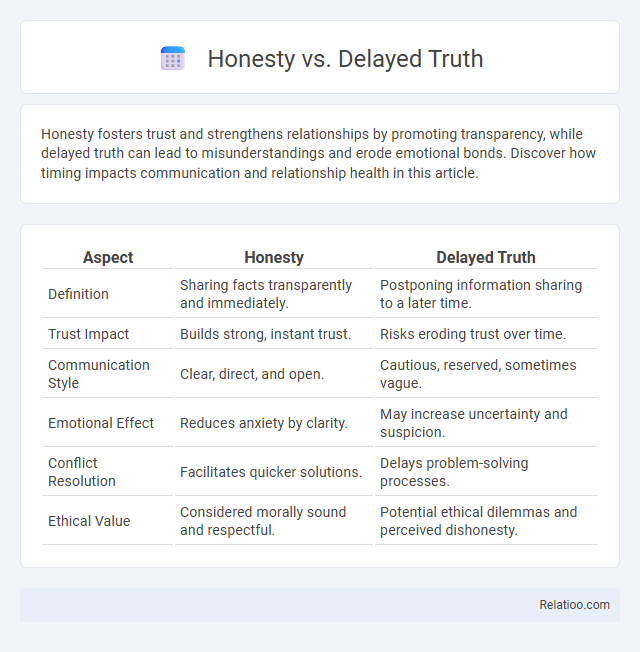Honesty fosters trust and strengthens relationships by promoting transparency, while delayed truth can lead to misunderstandings and erode emotional bonds. Discover how timing impacts communication and relationship health in this article.
Table of Comparison
| Aspect | Honesty | Delayed Truth |
|---|---|---|
| Definition | Sharing facts transparently and immediately. | Postponing information sharing to a later time. |
| Trust Impact | Builds strong, instant trust. | Risks eroding trust over time. |
| Communication Style | Clear, direct, and open. | Cautious, reserved, sometimes vague. |
| Emotional Effect | Reduces anxiety by clarity. | May increase uncertainty and suspicion. |
| Conflict Resolution | Facilitates quicker solutions. | Delays problem-solving processes. |
| Ethical Value | Considered morally sound and respectful. | Potential ethical dilemmas and perceived dishonesty. |
Defining Honesty and Delayed Truth
Honesty involves presenting facts openly and transparently, ensuring your communication is truthful and clear without omission. Delayed truth refers to the intentional postponement of sharing complete information, often to protect feelings or allow circumstances to mature before full disclosure. Understanding the balance between honesty and delayed truth helps you navigate timing strategically while maintaining integrity in your interactions.
The Psychology Behind Withholding Information
Withholding information triggers complex psychological dynamics involving trust, self-protection, and social harmony. Honesty fosters transparency and strengthens relationships, while delayed truth may serve as a strategic defense mechanism to mitigate immediate emotional impact. Timing influences the perception of truthfulness, where managing the disclosure moment balances ethical considerations and interpersonal consequences.
Ethical Implications of Delayed Truth
Delayed truth poses significant ethical challenges by potentially undermining trust and accountability in relationships or institutions. The intentional postponement of critical information can lead to harm, misinformed decisions, and erosion of credibility, contrasting with the moral imperative for honesty. Ethical frameworks emphasize transparency and timely disclosure to uphold integrity and respect for stakeholders' right to know.
Situational Factors Influencing Truth Timing
Honesty often demands immediate transparency, but situational factors such as emotional readiness, potential harm, and context sensitivity heavily influence the timing of your truth disclosure. Delayed truth can serve as a strategic choice to ensure receptivity, mitigate conflict, or protect relationships in delicate circumstances. Understanding these variables helps balance integrity with empathy, making your timing a crucial element in effective communication.
Honesty in Personal Relationships
Honesty in personal relationships fosters trust, emotional intimacy, and long-term stability, as transparent communication allows both partners to understand each other's true feelings and intentions. Delaying the truth can sometimes protect your loved ones from immediate pain but risks creating misunderstandings and eroding trust over time. Prioritizing honesty ensures that your relationships are built on a solid foundation, enabling authentic connections and mutual respect.
Delayed Truth in Professional Settings
Delayed truth in professional settings often serves as a strategic tool to manage sensitive information, minimize conflict, and maintain trust over time. While immediate honesty may lead to abrupt disruptions, carefully timed disclosure allows for thoughtful context and preparation, fostering workplace stability. Effective communication balances transparency with discretion, ensuring that delayed truth enhances decision-making and relationship sustainability without compromising integrity.
Effects on Trust and Credibility
Honesty strengthens trust and credibility by fostering transparency and reliability in communication, while delayed truth often undermines these qualities by creating doubt and suspicion once the full information emerges. Timing plays a critical role in how truth is perceived; revealing information at an appropriate moment can preserve relationships and credibility, whereas poor timing can damage trust even when honesty is maintained. The balance between immediacy and discretion determines whether honesty enhances or diminishes long-term trust and the perceived integrity of the communicator.
Cultural Perspectives on Truth-Telling
In many East Asian cultures, delayed truth-telling is practiced to preserve harmony and show respect, emphasizing collective well-being over immediate honesty. Western cultures often prioritize direct honesty as a core value, viewing transparency as essential for trust and individual rights. Indigenous communities may approach truth-telling with a focus on context and relational dynamics, where timing and the way truth is conveyed hold significant cultural importance.
Long-Term Consequences of Delayed Honesty
Delayed honesty often leads to erosion of trust, increased misunderstandings, and compounded conflicts over time, severely impacting long-term relationships. Studies in psychology reveal that timely truth-telling fosters deeper emotional bonds and resilience in both personal and professional environments. Businesses and individuals that prioritize immediate transparency tend to experience sustained credibility and reduced risk of reputational damage.
Finding the Balance: When to Speak the Truth
Navigating honesty versus delayed truth requires understanding the impact of timing on relationships and trust. You must assess the consequences of immediate disclosure against the benefits of waiting for the right moment to ensure clarity and sensitivity. Finding this balance enhances communication effectiveness while preserving respect and emotional well-being.

Infographic: Honesty vs Delayed Truth
 relatioo.com
relatioo.com